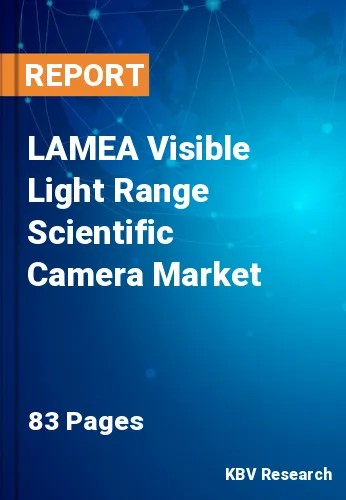The Latin America, Middle East and Africa Visible Light Range Scientific Camera Market would witness market growth of 10.7% CAGR during the forecast period (2022-2028).
The front cover of the camera is constructed of clear glass, and an optical lens system is mounted in front of it since it is intended to take pictures in visible light. X-rays cannot pass through the 2 mm thick transparent glass cover because it is translucent. The lens system and glass cover are removed from the camera to make it suitable for direct X-ray measurement, and an opaque front cover with an X-ray window is added to reduce the effect of visible light. The technique section comprehensively describes the CMOS camera and cover replacement processes. The camera should operate in single photon counting mode to measure X-ray energy-dispersive spectra.
The number of photon events on one camera pictures should be carefully regulated by altering the incident X-ray intensity or the single exposure period. The single photon counting mode is likely accomplished when the camera picture only displays several discrete dots rather than any continuous pattern. Processing the camera's photos is the following phase. The pixel intensities of the matching photon event on the picture may often be used to get the X-ray photon energy. An integrated-filtering approach guarantees the retrieval process is efficient and accurate. After processing the raw camera pictures, producing high-quality X-ray fluorescence (XRF) spectra is simple.
Saudi Arabia is changing in every area, including the economy, healthcare, education, and research. A knowledge-based economy is necessary to achieve Vision 2030. As a result, we quickly realized that medical R&D and clinical trials are crucial to enhancing healthcare, directly affecting patients, and making the most recent advancements in the pharmaceutical industry available and accessible to a larger pool of patients in Saudi Arabia. The R&D in the medical field is expected to raise the usage of the visible light range scientific camera in healthcare settings, propelling the market growth in the region.
The Brazil market dominated the LAMEA Visible Light Range Scientific Camera Market by Country in 2021, and would continue to be a dominant market till 2028; thereby, achieving a market value of $10.1 million by 2028. The Argentina market is experiencing a CAGR of 11.3% during (2022 - 2028). Additionally, The UAE market would display a CAGR of 10.4% during (2022 - 2028).
Based on Camera Resolution, the market is segmented into Less than 4 MP, 4 MP to 5 MP, 6 MP to 9 MP, and More than 9 MP. Based on Type, the market is segmented into sCMOS, sCMOS (Backthinned), CCD, CCD (Backthinned), and Others. Based on Camera Price, the market is segmented into Less than USD 15,000, USD 15,000 to USD 30,000, USD 31,000 to USD 50,000, and Others. Based on countries, the market is segmented into Brazil, Argentina, UAE, Saudi Arabia, South Africa, Nigeria, and Rest of LAMEA.
Free Valuable Insights: The Worldwide Visible Light Range Scientific Camera Market is Projected to reach USD 612.3 Million by 2028, at a CAGR of 6.7%
The market research report covers the analysis of key stake holders of the market. Key companies profiled in the report include Hamamatsu Photonics K.K., Teledyne Technologies, Inc., Atik Cameras Limited (SDI Group plc), Oxford Instruments plc, XIMEA Group, Photonic Science and Engineering Limited (Tibidabo Scientific Industries), Diffraction Limited, Spectral Instruments, Inc, Excelitas Technologies Corp., and Thorlabs, Inc.
By Camera Resolution
By Type
By Camera Price
By Country
Our team of dedicated experts can provide you with attractive expansion opportunities for your business.

